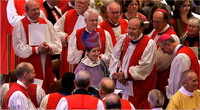Episcopal bishops make unsatisfying decision about gays
An unsatisfied reaction in supporters and opponents of gay clergy caused a statement by U.S. Anglican bishops hoping to keep their place in the global communion.

In the statement agreed after six days of private meetings in New Orleans, Episcopal bishops said they would "exercise restraint" by not consenting to any candidate for bishop "whose manner of life presents a challenge" to the church.
They also pledged not to approve official prayers to bless same-gender couples.
Some supporters of gay clergy accused Episcopal leaders of caving in to conservatives led by African archbishops, while traditionalists criticized what they saw as a cleverly worded declaration of defiance.
In Africa, Anglican leaders' mixed responses to the statement suggested work remained to prevent an Anglican schism.
The spokesman of the Anglican Church of Uganda, Aron Mwesigye, said: "They (the American bishops) deserve to be appreciated for making such a good decision. I also appeal to the gay bishops to repent and come out to live normal lives."
But Rt. Rev. Stephen Njihia Mwangi, the second most senior official of the Anglican Church of Kenya, questioned the timing of the statement just days before the Sunday deadline Anglican leaders had set for the Americans to make unequivocal pledges.
"I don't think they are serious about what they mean. I think the timing seems to suggest that this is just a technical thing to ensure that the Lambeth conference goes ahead," Mwangi told The Associated Press, referring to the once-a-decade meeting which brings together all the bishops in the Anglican world.
Bishop David Beetge, Vicar General of the Anglican Church of Southern Africa, said he welcomed the decision "for the simple reason it gives us more space and time to talk to each other."
"It is a very generous step and a good step and I think it shows willingness to dialogue with other parties," he said.
"I know there will be some on both sides that will say it is too much or too little, but I am appealing to give it a chance."
While Archbishop of Canterbury Rowan Williams cautiously thanked the bishops "for the care taken to understand and respond to the concerns of the wider communion," Anglicans awaited the verdict of Nigerian Archbishop Peter Akinola and other conservative critics of the American church.
"We believe this attempt to suck up to the homophobes will come to nothing," said Rev. Martin Reynolds of Britain's Lesbian and Gay Christian Movement. He accused the conservatives of being determined to force a rupture in the Anglican Communion.
The dispute has been tearing at the Anglican Communion, a loose federation of 38 national churches, since 2003 when the Episcopal Church confirmed the election of V. Gene Robinson as bishop of New Hampshire.
The choice of Robinson, who lives with a male partner, defied a declaration by Anglican bishops at their Lambeth Conference in 1998 that homosexual relationships were incompatible with Scripture.
In February, leaders of the national churches - called primates - set a Sept. 30 deadline for the Episcopal Church to promise not to approve any more gay bishops or to approve blessings of gay partnerships.
The bishops' statement "does show a willingness to try to satisfy the conditions laid down by the primates," said David Phillips of the Church Society.
"However, the problem is that at heart it changes nothing. Most of these bishops are still committed to teach things that are contrary to Scripture," Phillips wrote on the society's Web site.
Rev. Colin Coward, director of Changing Attitude England, believed the bishops had met the request.
"If conservatives continue to press for the exclusion of the Episcopal Church, transgress provincial boundaries and decide not to attend the Lambeth Conference in 2008, they will take responsibility for provoking a tear in the Anglican Communion and will have withdrawn from the fellowship," Coward said.
Giles Goddard, who chairs Inclusive Church in Britain, said attempts to reconcile the split were now effectively dead.
Anglican commitments to listen to the concerns of gays were not carried out "with any degree of seriousness by those people who have most to lose by genuine engagement - that is, those parts of the Episcopal Church loosely grouped under the American Anglican Council, the Province of Nigeria and conservative groups in England," Goddard said.
Subscribe to Pravda.Ru Telegram channel, Facebook, RSS!





